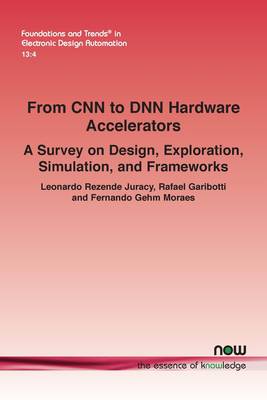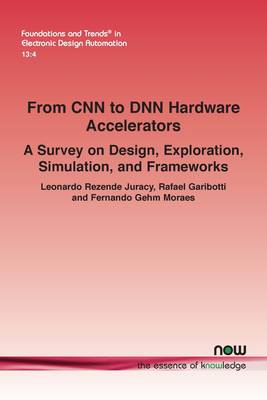
- Afhalen na 1 uur in een winkel met voorraad
- Gratis thuislevering in België vanaf € 30
- Ruim aanbod met 7 miljoen producten
- Afhalen na 1 uur in een winkel met voorraad
- Gratis thuislevering in België vanaf € 30
- Ruim aanbod met 7 miljoen producten
Zoeken
From CNN to Dnn Hardware Accelerators: A Survey on Design, Exploration, Simulation, and Frameworks
Leonardo Rezende Juracy, Rafael Garibotti, Fernando Gehm Moraes
€ 88,45
+ 176 punten
Omschrijving
The past decade has witnessed the consolidation of Artificial Intelligence technology, thanks to the popularization of Machine Learning (ML) models. The technological boom of ML models started in 2012 when the world was stunned by the record-breaking classification performance achieved by combining an ML model with a high computational performance graphic processing unit (GPU). Since then, ML models received ever-increasing attention, being applied in different areas such as computational vision, virtual reality, voice assistants, chatbots, and self-driving vehicles. The most popular ML models are brain-inspired models such as Neural Networks (NNs), including Convolutional Neural Networks (CNNs) and, more recently, Deep Neural Networks (DNNs). They are characterized by resembling the human brain, performing data processing by mimicking synapses using thousands of interconnected neurons in a network. In this growing environment, GPUs have become the de facto reference platform for the training and inference phases of CNNs and DNNs, due to their high processing parallelism and memory bandwidth. However, GPUs are power-hungry architectures. To enable the deployment of CNN and DNN applications on energy-constrained devices (e.g., IoT devices), industry and academic research have moved towards hardware accelerators. Following the evolution of neural networks from CNNs to DNNs, this monograph sheds light on the impact of this architectural shift and discusses hardware accelerator trends in terms of design, exploration, simulation, and frameworks developed in both academia and industry.
Specificaties
Betrokkenen
- Auteur(s):
- Uitgeverij:
Inhoud
- Aantal bladzijden:
- 88
- Taal:
- Engels
- Reeks:
Eigenschappen
- Productcode (EAN):
- 9781638281627
- Verschijningsdatum:
- 6/03/2023
- Uitvoering:
- Paperback
- Formaat:
- Trade paperback (VS)
- Afmetingen:
- 156 mm x 234 mm
- Gewicht:
- 136 g

Alleen bij Standaard Boekhandel
+ 176 punten op je klantenkaart van Standaard Boekhandel
Beoordelingen
We publiceren alleen reviews die voldoen aan de voorwaarden voor reviews. Bekijk onze voorwaarden voor reviews.











